Choosing the right tires for my SUV is key to its performance. The right tires can boost fuel efficiency, safety, and overall performance. With so many options, picking the best tires for SUVs can be tough. But, knowing what affects tire performance helps me make the right choice.
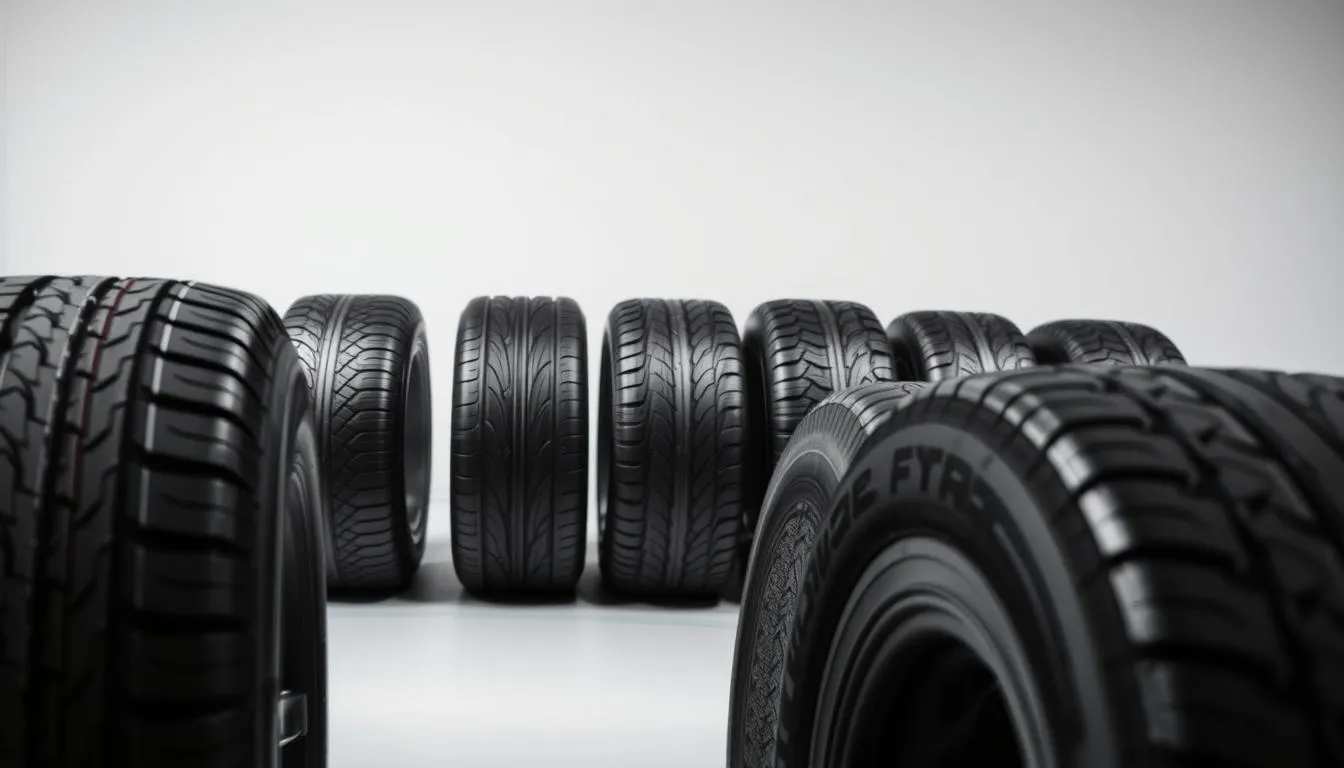
To get the most from my SUV, selecting the right tires is crucial. The right tires can enhance fuel efficiency, safety, and performance. Investing in the best tires for SUVs is a smart move for me.
Key Takeaways
- Choosing the right tires can improve fuel efficiency and safety.
- SUV tire selection is crucial for overall tire performance.
- The best tires for SUVs can unlock my vehicle’s full potential.
- Understanding key factors that affect tire performance is essential for making an informed decision.
- Investing in the best tires for SUVs can be beneficial in the long run.
Table Of Contents
- 1 Understanding Why Tire Selection Matters for Your SUV
- 2 Best Tires for SUVs: Top Brands and Models
- 3 All-Season vs Specialized SUV Tires
- 4 Size Matters: Choosing the Right Tire Dimensions
- 5 Weather-Ready: Selecting Tires for Your Climate
- 6 Balancing Cost and Quality in SUV Tires
- 7 Maintenance Tips to Extend Your SUV Tire Life
- 8 Conclusion: Making Your Final Tire Selection
- 9 FAQ For SUV’s Performance with the Best Tires
Understanding Why Tire Selection Matters for Your SUV
Exploring SUV tires, I see how picking the right ones is key. The right tires boost fuel efficiency, cutting down on gas costs and pollution. Studies show they can up fuel efficiency by 10% and cut accident risk by 20%.
Tire choice is also a big deal for safety considerations. Tires with advanced tread and low rolling resistance are safer and perform better. For example, good traction tires help with handling and braking, lowering accident risks.
When picking tires for my SUV, I look at a few things:
- Tire size and type
- Tread pattern and depth
- Rolling resistance and fuel efficiency
- Safety considerations and handling
Knowing these factors helps me choose the best tires. This boosts my SUV’s tire performance, fuel efficiency, and safety considerations. With the right tires, driving becomes smoother, safer, and more efficient.
Best Tires for SUVs: Top Brands and Models
Choosing the right tires for SUVs is important. There are many top brands and models to pick from. I’ll talk about their features, like performance, safety, and how well they use fuel. Brands like Michelin, Continental, and Goodyear have many models for different needs.
Let’s look at some top SUV tires. The Michelin Premier LTX is great for traction and handling. The Continental TerrainContact A/S is good for all seasons. These tires offer a mix of performance, safety, and fuel efficiency.
When picking SUV tires, consider these key features:
- Performance: Look for tires with advanced compounds and designs for better traction and handling.
- Safety: Choose brands and models with a strong safety record. They should have better braking and cornering.
- Fuel efficiency: Pick tires with low rolling resistance. They help save fuel and reduce emissions.
In summary, the best SUV tires depend on many factors. These include your driving habits, the roads you drive on, and what you prefer. By looking at top brands like Michelin, Continental, and Goodyear, you can find the best tires for your SUV.
All-Season vs Specialized SUV Tires
Choosing the right tires for my SUV is a big decision. I’m torn between all-season tires and specialized tires. All-season tires balance performance, safety, and fuel efficiency. They’re perfect for areas with mild winters and hot summers.
Specialized tires, like winter or summer tires, are made for specific conditions. They offer better performance in extreme weather.
All-season tires are handy for drivers who don’t want to change tires often. But, they might not perform as well as specialized tires in extreme weather. For example, winter tires are essential in harsh winter areas. They improve traction and control on snowy and icy roads.
Summer tires are best for warm weather. They enhance handling and braking on dry roads. They’re ideal for areas with hot summers and mild winters.
Here are some things to think about:
- Driving conditions: Specialized tires might be better in extreme weather.
- Performance: Summer tires are great for handling and braking.
- Convenience: All-season tires are easy to use without changing tires often.
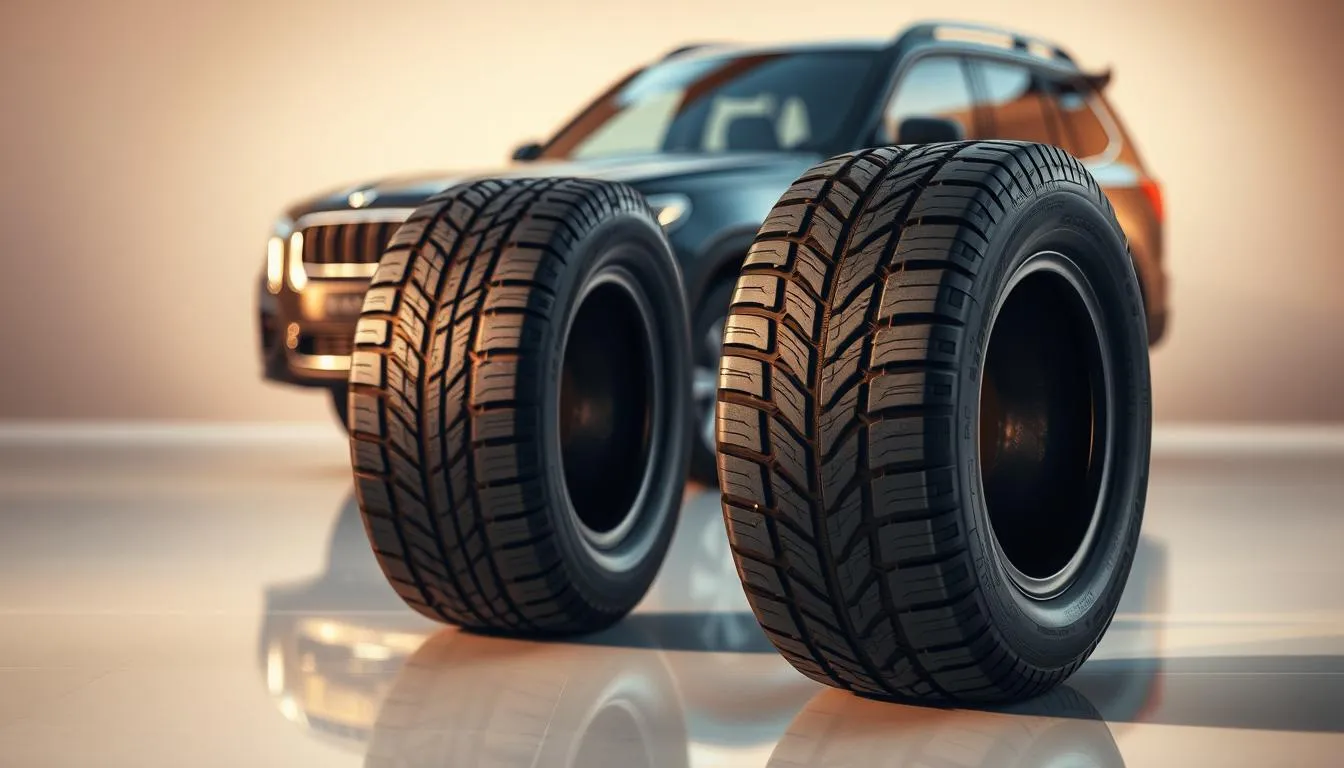
The choice between all-season and specialized tires depends on your needs. Think about the pros and cons of each. This way, you can pick the best tires for your SUV.
Size Matters: Choosing the Right Tire Dimensions
When picking the right tires for your SUV, tire size and tire dimensions are key. They ensure your SUV performs well, stays safe, and uses less fuel. As I explore SUV tire fitment, I’ve learned that the right tire size greatly affects your drive.
Here are some things to think about when choosing tire fitment:
- Type of SUV: Each SUV model needs specific tires. Always check your vehicle’s manual or the manufacturer’s website for the right size.
- Driving conditions: If you often drive in bad weather or off-road, you might need bigger tires for better grip.
- Personal preferences: Some drivers care more about saving fuel, while others want better performance and handling.
Here’s a simple table to help you understand how tire size affects performance:
| Tire Size | Performance | Fuel Efficiency |
|---|---|---|
| Larger | Better traction and handling | Lower fuel efficiency |
| Smaller | Improved fuel efficiency | Reduced traction and handling |
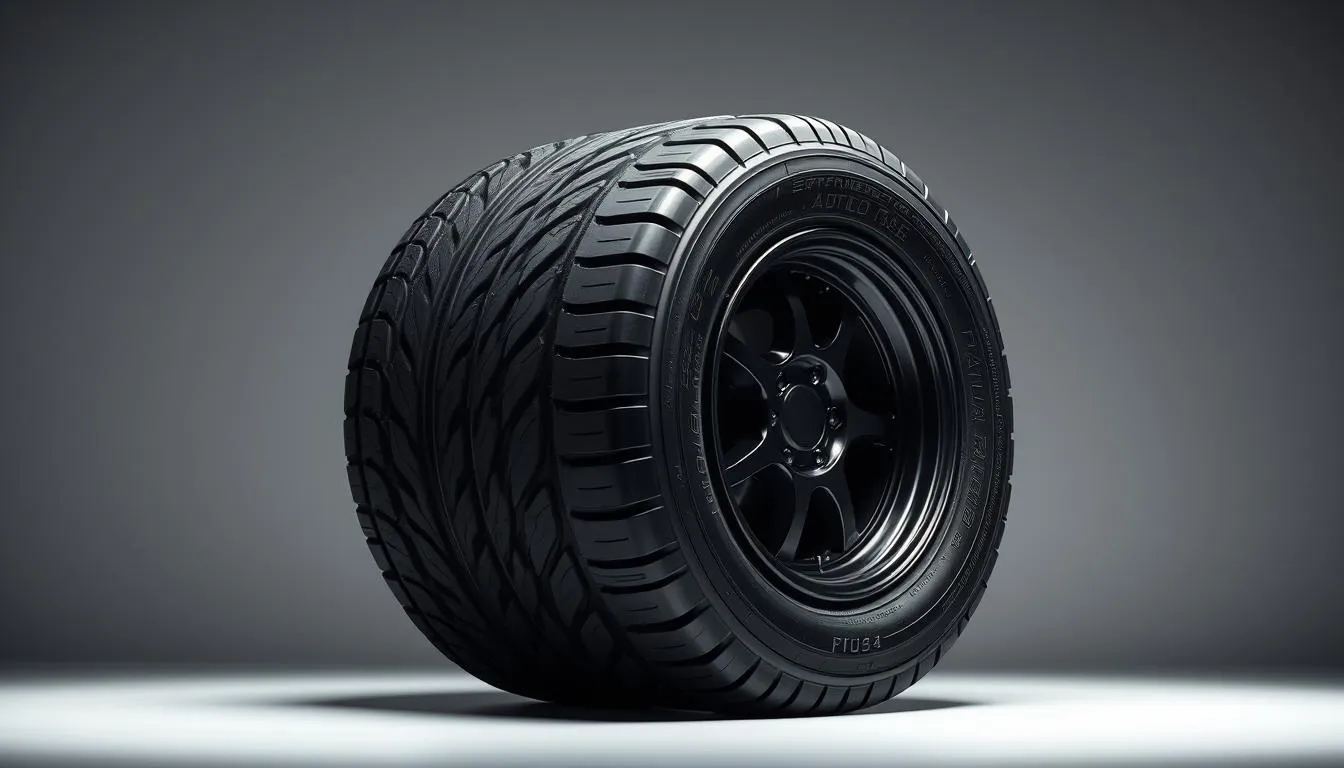
By considering these factors and knowing how tire size and dimensions affect your SUV, you’ll make a better choice. This will help you pick the perfect tires for your vehicle.
Weather-Ready: Selecting Tires for Your Climate
When picking the best tires for my SUV, I think about the weather a lot. The climate and weather where I live are key. I want tires that are ready for any weather, ensuring safety and better performance.
For hot weather, I look for tires with special tread patterns and compounds. These help them handle high temperatures well. In cold weather, I need tires with deeper treads and special rubber for snowy roads. The right tires make driving safer and smoother.
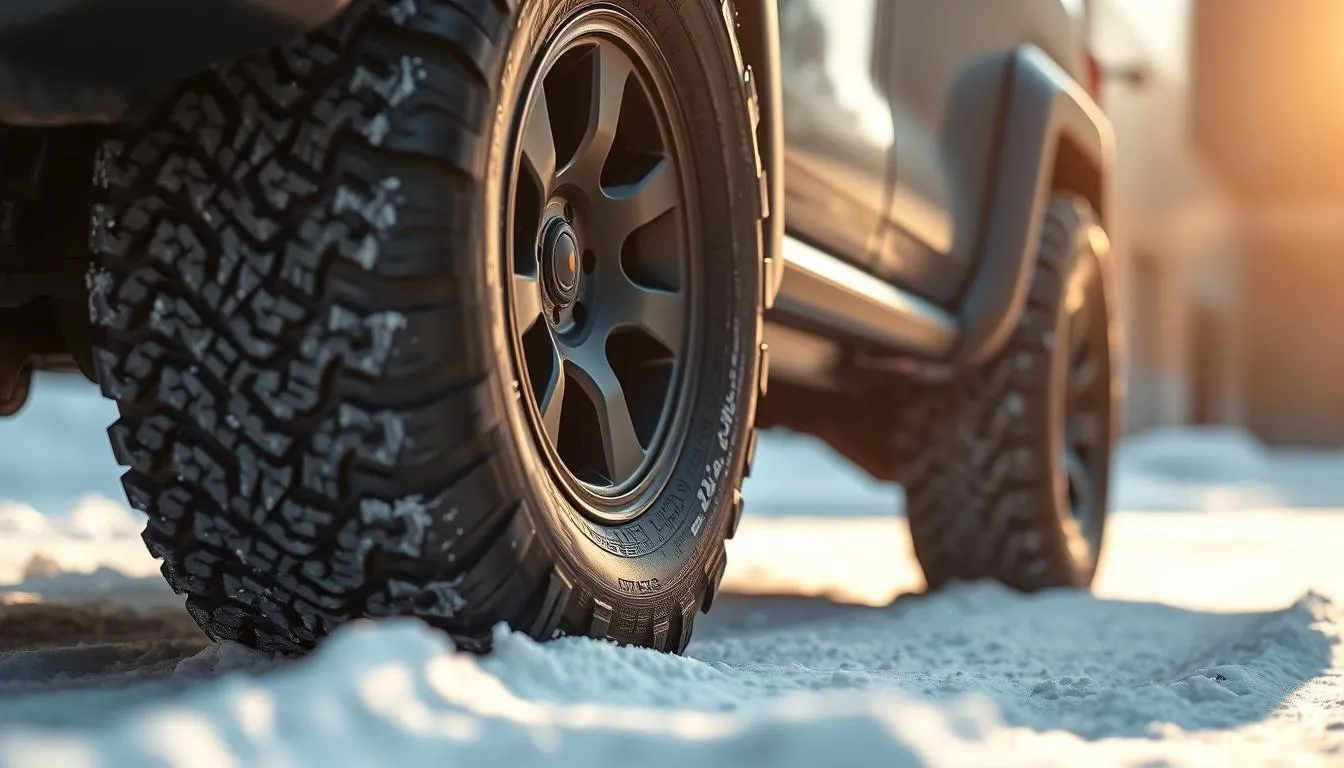
I also consider how tires handle wet roads. Tires with good hydroplaning resistance and tread designs are crucial. Choosing the right tires means I can drive confidently, no matter the weather.
Some important things to think about when picking tires include:
- Tread pattern and depth
- Tire compound and materials
- Inflation pressure and maintenance
By focusing on these, I can make sure my SUV performs well in all weather. This makes driving safer and more comfortable.
Balancing Cost and Quality in SUV Tires
When I think about getting new tires for my SUV, I weigh tire cost and tire quality. The price of tires changes a lot, based on the brand, model, and quality. It’s key to think about the upfront cost versus the long-term benefits of quality tires.
Looking at SUV tire value, I consider performance, safety, and fuel efficiency. Even though quality tires might cost more at first, they offer better handling, braking, and traction. These are crucial for my SUV’s performance. Plus, they can also improve fuel efficiency, saving me money in the long run.
Here are some key things to think about when balancing tire cost and tire quality:
- Research different brands and models to compare prices and features
- Read reviews and ratings from other SUV owners to get a sense of a tire’s performance and durability
- Consider the warranty and support offered by the manufacturer
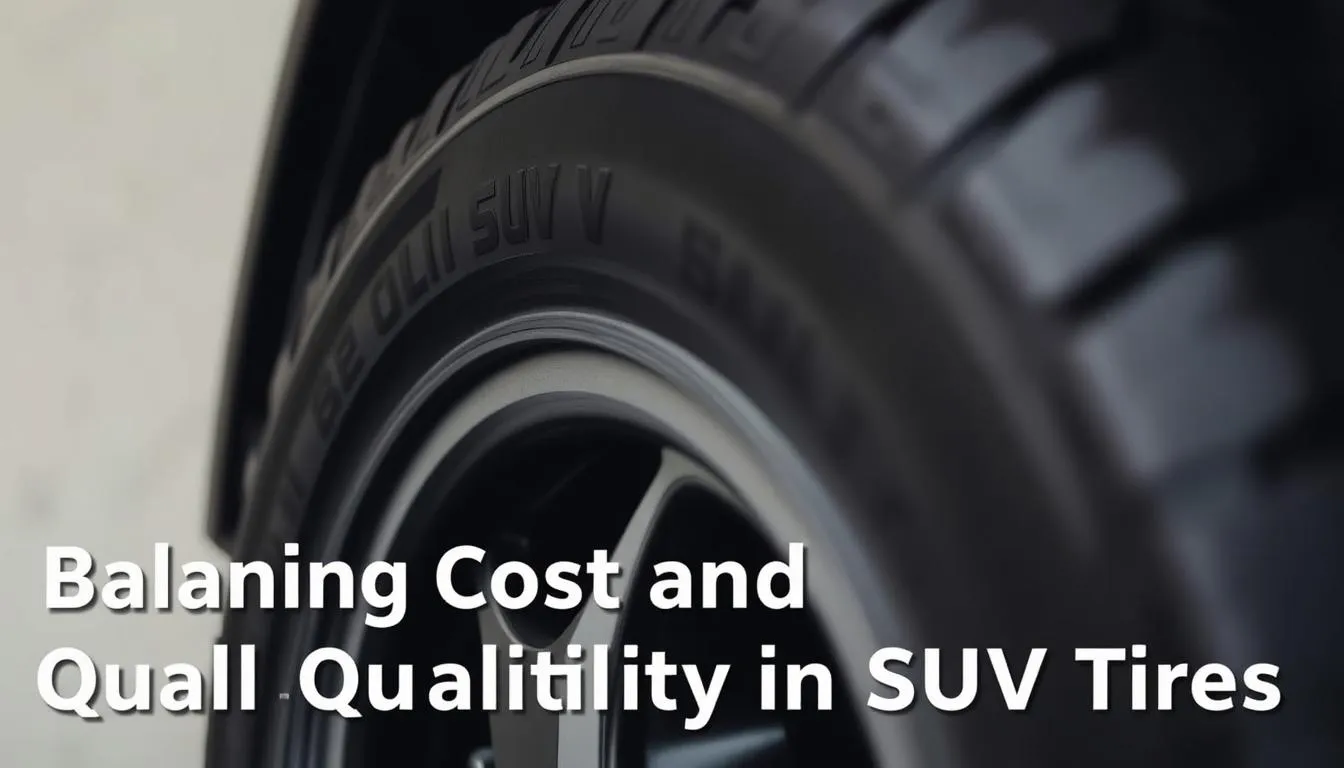
By carefully looking at these points and thinking about what I need, I can make a smart choice. This choice balances tire cost and tire quality, finding the best value for my SUV.
Maintenance Tips to Extend Your SUV Tire Life
As an SUV owner, I know how vital tire maintenance is. It keeps my tires running well, safe, and fuel-efficient. Regular tire rotation helps wear them out evenly, making them last longer.
Keeping an eye on tire pressure is also key. The right pressure boosts fuel efficiency and safety. I check mine monthly and before long drives. Here are some tips for you:
- Rotate your tires every 5,000 to 8,000 miles
- Check your tire pressure at least once a month
- Align your wheels properly to prevent uneven wear
By sticking to these tips, you can make your SUV tires last longer. They’ll perform better, be safer, and use less fuel. Remember, regular
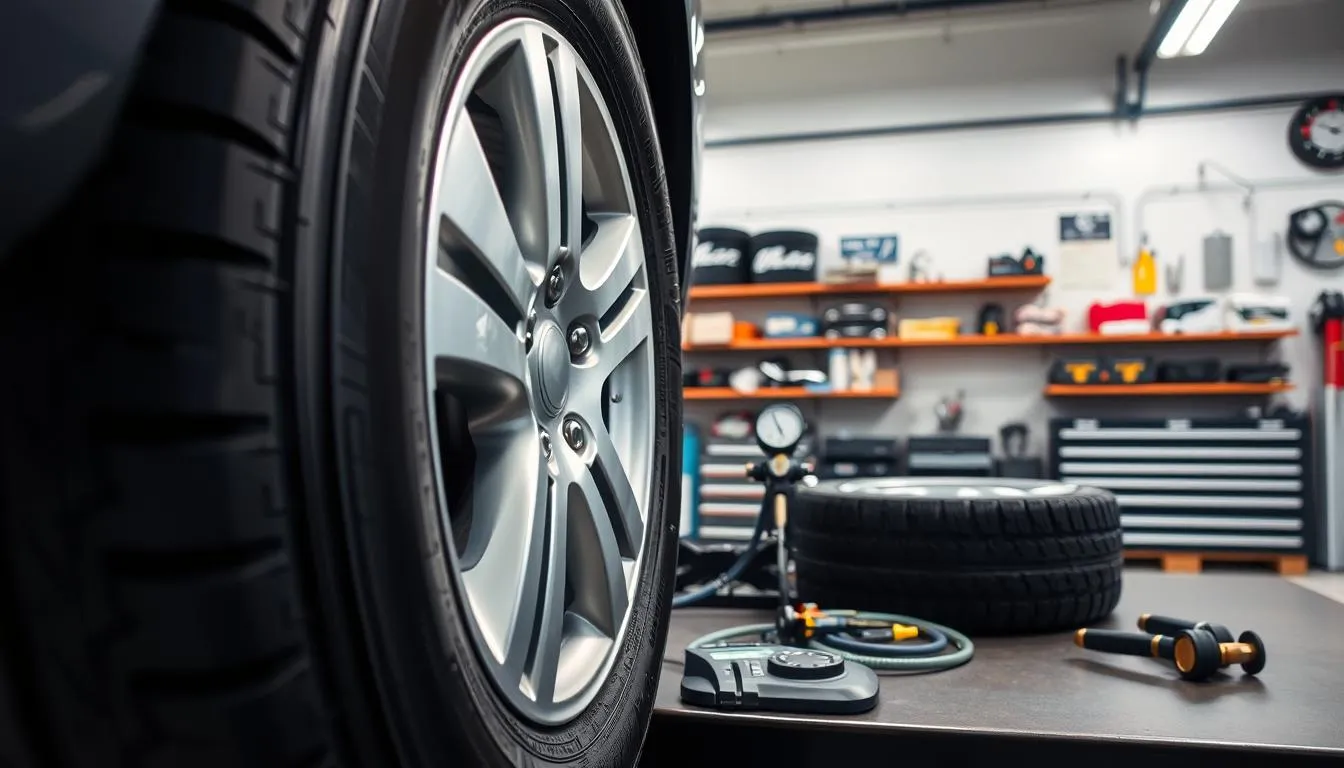
Conclusion: Making Your Final Tire Selection
As you finish choosing tires for your SUV, think carefully about what we’ve covered. The right tires can make your SUV safer, more comfortable, and more fuel-efficient. This is key to getting the most out of your vehicle.
Choosing tires is a personal choice. Look at the SUV tire guide and pick tires that fit your driving style, climate, and preferences. Whether you need all-season, winter, or summer tires, make sure they offer great performance, safety, and fuel efficiency.
By choosing wisely and taking good care of your tires, you can make them last longer. Regular checks, like rotation, pressure, and alignment, are crucial. With the right tires and care, your SUV will perform well for many years.
FAQ For SUV’s Performance with the Best Tires
What are the key factors that affect tire performance for SUVs?
Key factors include fuel efficiency, safety, and performance. The right tires can greatly improve these areas. It’s crucial to pick the best tires for your SUV.
How do all-season and specialized tires differ in terms of SUV performance?
All-season tires balance performance, safety, and fuel efficiency. Specialized tires are made for specific conditions, like winter or summer. Your choice depends on your climate and driving habits.
What are the benefits of choosing the right tire size and dimensions for my SUV?
The right tire size affects performance, safety, and fuel efficiency. Larger tires offer better traction but might use more fuel. Smaller tires improve fuel efficiency but may affect handling.
How can I ensure my SUV tires are well-maintained and last longer?
Regular rotation, pressure checks, and alignment are key. They help your tires last longer and perform better. This also ensures safety and better fuel efficiency.
What should I consider when balancing the cost and quality of SUV tires?
The cost of tires varies a lot. But, it’s important to find a balance between cost and quality. High-quality tires might cost more upfront. However, they offer better performance, safety, and fuel efficiency in the long run.




